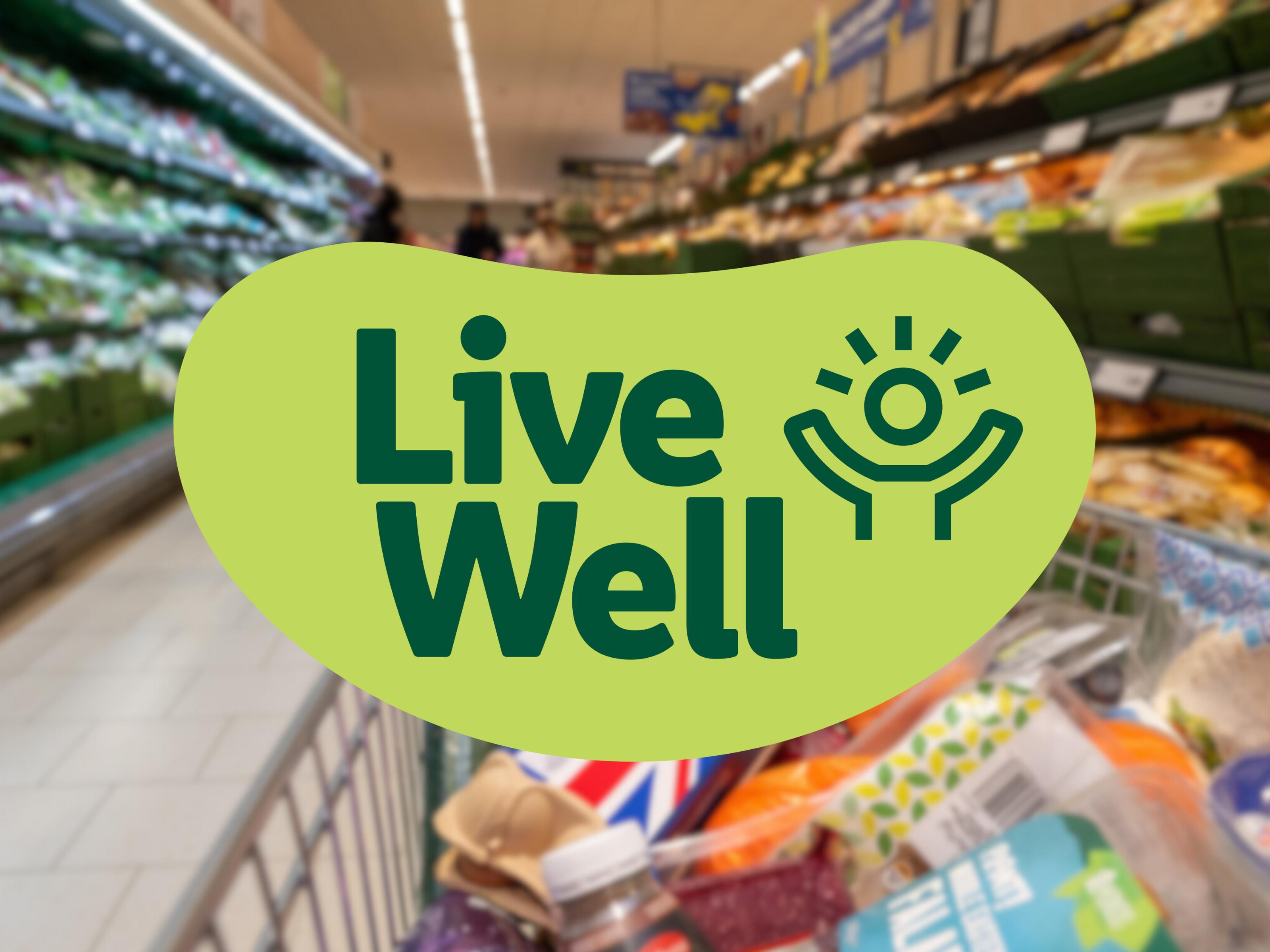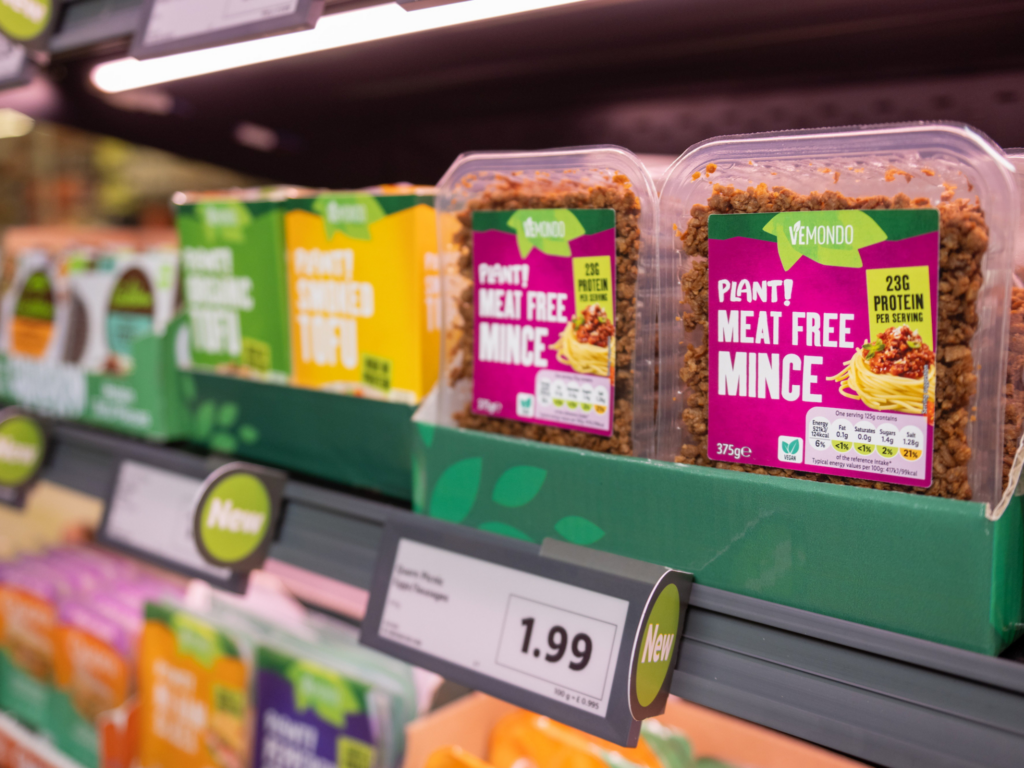
Lidl GB is building on its plant-based targets with a new Live Well logo for private-label products that align with the Planetary Health Diet.
Further extending its food sustainability leadership, Lidl has created a new label designed to help UK consumers find healthy and planet-friendly foods in-store.
The Live Well logo is based on evidence-based nutrition and sustainability benchmarks, and will appear on private-label offerings to help the discounter align with the Planetary Health Diet by 2050. Some of the criteria include the presence of at least one plant protein or whole-grain ingredient, fully recyclable packaging where possible, and being a source of fibre.
The nutrition targets are validated by the British Nutrition Foundation, while the sustainability criteria are based on Lidl’s global partnership with the World Wide Fund for Nature (WWF). The label will be rolled out across 100 own-label products, including produce, whole grains and plant-based proteins, in the next six months.
The move builds on the retailer’s commitment to increase the proportion of plant-based foods sold by 20% by the end of the decade. Lidl GB has now also pledged to make 10% of its private-label products meet the Live Well criteria during this period.
Which products can use Lidl’s Live Well label?

The launch of Live Well is in response to research commissioned by Lidl and the Planetary Alliance, which found that four in five Brits view eating healthily as important, but over three-quarters want clearer guidance to find healthy products.
To sport the logo on their packaging, products would need to have at least one specific, authorised nutrition and associated health claim, while also meeting criteria tailored to their category’s nutritional profile.
Aside from cheese, all foods would need to be not high in fat, salt or sugar, and have green traffic light labels for total sugar and saturated fat, and amber or green labels for fat and salt. They also must not exceed the government’s salt, sugar or calorie targets, and be a source of fibre.
Fresh fruits and vegetables must meet agriculture sustainability standards such as LEAF certification, organic or RSPCA Assured, and be either locally sourced or be Fairtrade or Rainforest Alliance certified. Rice products, meanwhile, must contain at least one whole-grain, plant-based protein, or vegetable ingredient.
Vegan alternatives to animal products, meanwhile, must have a plant protein ingredient, and meat alternatives need to be fortified with iron and vitamin B12. And if they contain palm oil, the fat must be certified to the RSPO Segregated standard.
Medium or hard cheeses need to be low in fat and/or calories and in line with maximum salt targets. For dairy-free cheese, products cannot contain more than 15g of saturated fat per 100g, and must be fortified with calcium.
Additionally, all Live Well products must come in 100% recyclable packaging (where technically feasible and safe), and their suppliers must commit to setting climate targets by the end of 2026.
“As UK supermarkets, we must go further if we’re serious about supporting healthier lives whilst also meeting our net-zero commitments. We must broaden our view on health and consider planetary health alongside human health, moving beyond narrow definitions and supporting the wider food system,” said Lidl GB’s chief commercial officer, Richard Bourns.
Lidl’s move comes amid government’s healthy food push

The Planetary Health Diet was designed by the Eat-Lancet Commission in 2019 as a way to feed 10 billion people and keep the planet healthy by 2050. It recommends that fruits and vegetables should make up over half of people’s diets. As for the rest, more than a third should come from whole grains, plant proteins and plant oils, while dairy products, meat and seafood should only make up 3.6% each.
Studies have shown that following this dietary pattern could lower global emissions by between 17% and 29%, and reduce the risk of premature death by 30%. And earlier this year, dozens of climate and health organisations urged the UK government to update its Eatwell Guide in line with the Planetary Health Diet.
“We’re proud to be launching our new Live Well logo, building on our industry-leading plant-based food sales commitment announced earlier this year to align with the Planetary Health Diet by 2050,” said Bourns. Lidl has also committed to reporting its progress against the Live Well goal annually.
The logo is encased in a green-coloured bean, playing into experts’ call to “make beans more appetising”. A Food Foundation report last year found that beans and grains are, on average, the strongest-performing foods on sustainability, nutrition and price fronts.
“Beans are not just high in fibre and packed with protein. They, along with other legumes, play an important role in keeping soil healthy for crops and can support greater biodiversity – so they’re our hero food when talking about diets that support the Planetary Health Diet, being good for you and good for the planet,” Lidl GB said on its website.
Aside from the goal to increase overall plant-based food sales (which is a global target), Lidl also has a UK-specific commitment to have 25% of its meat and seafood sales sourced from plants by the end of the decade (in 2021, this was 14%), and double the sales share of non-dairy products from a baseline of 6.4% in 2021.
The Live Well launch comes weeks after the British government partnered with supermarkets to tackle obesity and encourage healthy eating. As part of this, retailers will mandatorily report on healthy food sales, though advocacy groups have said these disclosures must also include the split between plant and animal protein sales.
“Making the healthy choice the easiest choice is critical to a healthier, more sustainable food environment,” British Nutrition Foundation CEO Elaine Hindal said of Lidl’s new label. “With over 980 Lidl stores across the UK, this project is an excellent example of a collaboration that can deliver genuine impact towards the government’s new food strategy, and do so at pace and at scale.”
The post Lidl Extends Plant-Based Promise with Label to Spotlight Healthy & Sustainable Food appeared first on Green Queen.
This post was originally published on Green Queen.